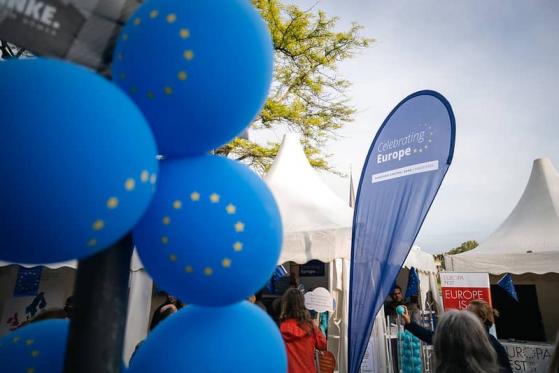PoundSterlingLIVE - Thursday's European Central Bank (ECB) policy meeting could squeeze more good news out of the Euro according to analysts who see a slowing economy and easing inflation as reasons to believe July's rate hike will be the last.
The ECB pre-committed to raising interest rates again in July at its June meeting, meaning the decision to lift rates won't be of significance to the market, but changes in guidance regarding a September hike could prompt foreign exchange volatility.
"We stick to our view that in light of an increasingly challenging domestic backdrop too much good news remains priced into the EUR, as any eventual lack of a hawkish tone from the ECB on Thursday could force some EUR longs to be unwound," says Valentin Marinov, Head of G10 FX Strategy at Crédit Agricole.
The Euro has been one of FX's outperformers in 2023 owing to improved economic sentiment as 2022's energy shock fades and as higher ECB interest rates boost the attractiveness of Eurozone assets. By raising interest rates a further 25 basis points on Thursday the ECB's deposit rate will rise to 3.75% and the MRO to 4.25%.
Ahead of the decision we see the Euro trade-weighted index - a broader measure of Euro performance against a host of currencies - is near all-time highs.
But the Eurozone economy is effectively in recession according to official data that confirmed two subsequent quarters of contraction, and the outlook is by no means improving according to July's PMIs which are firmly located in the contractionary zone.
"The euro area economy is faltering under the conflux of high inflation, rapid rate hikes, weak global trade, geopolitical risks and energy transition," says Brian Martin, Head of G3 Economics at ANZ.
Eurozone inflation is meanwhile in decline, suggesting the peak is now in, and raising questions if further rate hikes are necessary.
Henry Allen, an economist at Deutsche Bank (ETR:DBKGn), says markets have continued to downgrade the chances of a second hike after tomorrow’s decision, with the probability now at 75% this morning, having been 88% at the end of last week.
The decline in these expectations has coincided with a retreat in the Euro-Dollar exchange rate from a high at 1.1275 to current levels at 1.1068, the Euro-Pound rate has meanwhile retreated from last week's high at 0.87 to 0.8568 (Pound to Euro rate up from 1.1490 to 1.1670).
But odds at 75% signal the market - and therefore Euro exchange rates - is still invested in a September rate hike. The Euro can therefore lose further altitude should these expectations deflate further following the ECB's July meeting.
"We do think this hike will mark the end of the hiking cycle, with peak rates settling at 3.75%. The inflation data is softening. Growth data has continued to weaken. Expect the ECB to repeat the main elements of the statement in order avoid markets repricing too strongly," says a note from the rates strategy team at NatWest (LON:NWG) Markets.
Jamie Dutta, Market Analyst at Vantage, says softer headline inflation and some of "this week’s shockingly weak PMI figures may cause officials to cast doubt on the bank’s recent rosier macro forecasts".
He says the subdued growth outlook will challenge any hawks who have been primarily concerned with elevated inflation.
One such hawk, Klass Knot, said last week that a September rate hike was not a done deal, in what amounts to a clear signal the ECB could contemplate a pause.
For sure, guidance will almost certainly keep alive the possibility of further hikes should the data warrant, but the forceful forward guidance of past meetings will be lacking.
"It seems sensible for the ECB to emphasise a data-dependent, meeting-by-meeting stance. A non-committal Lagarde should also probably be advised to adopt a 'less is more' approach. The bank will have an array of economic data, plus the latest staff projections by the time we get to the next meeting in mid-September," says Dutta.
To what extent such a shift to data dependence is considered a 'dovish' turn by Frankfurt will determine the extent of the Euro's reaction.
"The euro will remain under pressure if the bank’s stance turns dovish on Thursday," says Dutta.
ANZ's Martin thinks the anticipated rate rise could be the last in the current cycle as his estimates indicate that ECB interest rates are now around levels consistent with returning inflation to the 2.0% target over the forecast horizon.
"Whilst there is a risk that the ECB could need to hike a little further, the rapid rate rises over the past 12 months must be given time to work. The interest rate hiking cycle should no longer be on a pre-set course," says Martin.
An original version of this article can be viewed at Pound Sterling Live
Should you invest $2,000 in GS right now?
Before you buy stock in GS, consider this: ProPicks AI are 6 easy-to-follow model portfolios created by Investing.com for building wealth by identifying winning stocks and letting them run. Over 150,000 paying members trust ProPicks to find new stocks to buy – driven by AI. The ProPicks AI algorithm has just identified the best stocks for investors to buy now. The stocks that made the cut could produce enormous returns in the coming years. Is GS one of them?
Reveal Undervalued Stocks Now